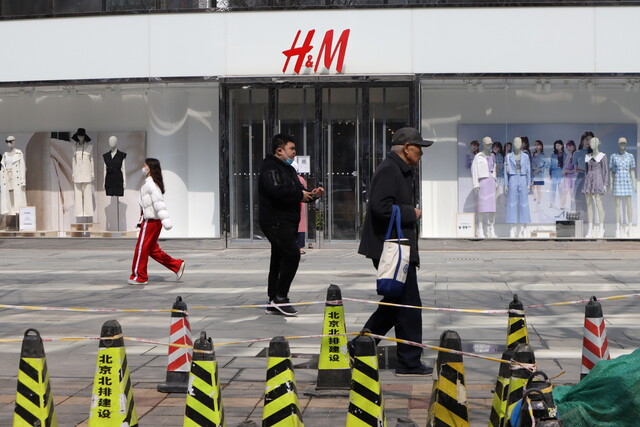On the 25th, citizens in Beijing, the capital of China, pass in front of a store of H&M, a Swedish clothing company. Beijing/Reuters Yonhap News
The conflict between the West and China, including the United States, over the crackdown on human rights of Uighurs in Xinjiang in western China, is spreading as a’patriotic frenzy’ in China, including boycotts of Western products. According to reports from the government on the 25th, the boycott of Chinese netizens against various Western brands such as AIDAs and Nike, starting with’H&M’ (H&M), a global clothing company in Sweden, is turning its tail. This is because these companies have announced their intention to stop using cotton grown in Xinjiang, which has been suspicious of human rights abuses such as forced labor in the past. Earlier, the H&M side posted a statement on the official website in September last year, saying, “I am deeply concerned about reports on Xinjiang’s forced labor and discrimination against ethnic minorities.” . The company’s response came as the Swiss-based cotton industry watchdog’Initiative for Better Cotton’ (BCI) urged the world’s major apparel companies to stop buying kidney cotton linked to forced labor. will be. This statement, which was not a problem at the time of its announcement, was of interest when the European Union (EU) announced sanctions against China on the 22nd for the crackdown on human rights in Xinjiang. In particular, as the Chinese Communist Youth Corps (Public Cheongdan) and others criticized the contents of the company’s statement on the 24th, netizens’ intensive offensive began. “You mean, on the one hand, spreading false rumors, boycotting kidney cotton, and on the other hand, making money in China? Awakening your dreams!” was rapidly spreading among Chinese netizens. As the reaction of netizens intensified, major Chinese online shopping malls such as Taobao, Jingdong and Pinduo dropped products related to this company all at once. Information and communication companies that operate smartphone app stores, such as Xiaomi, Huawei, and Teng Xun, also prevented from downloading H&A’s apps. In addition, celebrities who were active as advertising models for this company, such as Hwang Xun and Song Cham, made statements one after another, saying, “We will stop all cooperation. As the situation worsened, the H&M side made a statement on Weibo on the night of the 24th, saying, “We always respect Chinese consumers.” “We are working with more than 350 companies in China to provide sustainable apparel products to consumers in China and around the world,” the company said. “We will continue to make long-term investments in China and contribute to development.” Nevertheless, some netizens continued to criticize, saying, “I still don’t seem to know what I did wrong.” It’s not just H and M. Nike and Adidas, which expressed concern over reports of forced labor in Xinjiang, as well as New Balance, Burberry, and Uniqlo, are gradually becoming the targets of the boycott. Anta, a Chinese mid-high-priced shoe brand, declared, “We have only used cotton produced in China, including kidneys, and will continue to do so,” and declared withdrawal from the’Better Cotton Initiative’. The Chinese government also seems to promote this atmosphere. Chinese Foreign Ministry spokesman Hua Chun-ying said at a regular briefing that “the allegations that there was human rights abuses such as forced labor in Xinjiang are a malicious fabrication of anti-Chinese forces trying to suppress China’s development and damage the image of China.” Regarding the movement, “the Chinese have the right to express their feelings.” Correspondent from Beijing/Inhwan Jung [email protected]
newsletter
Every morning, every Thursday day
A friendly newsletter that will save you from the flood of news.
Meet
